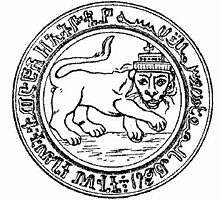Negus

Negus (Ge'ez: ነጉሥ?, nəgūś IPA: [nɨguːɬ]; Amharic: nigūs?; cf. Tigrinya: ነጋሲ? negus) is a royal title in the Ethiopian Semitic languages.[1] It denotes a monarch,[2] such as the Bahri Negus (Lord of the Seas) of the Medri Bahri kingdom in pre-1890 Eritrea, and the Negus in pre-1974 Ethiopia.
Overview
Negus is a noun derived from the Ethiopian Semitic root ngś, meaning "to reign". The title has subsequently been used to translate the words "king" or "emperor" in Biblical and other literature. In more recent times, it was used as an honorific title bestowed on governors of the most important provinces (kingdoms): Gojjam, Welega and the seaward kingdom (where the variation Bahr Negasi "King of the Sea", was the ancient title of the ruler of present-day central Eritrea) and later Shewa.
Both uses and the imperial dignity would meet in the person of a regional prince, Lij Kassa Hailu, the third youngest son of Däjazmač Hailu Wolde-Giyorgis, Governor of Qwara Province, by his second wife Woizero Attitaggab. He rebelled against Empress Menen and her son, the Viceroy Ras Ali II of Yejju, in 1845 and spent the next nine years alternating between rebellion and submission until he was proclaimed negus at Amba Chera on 19 September 1854, and after the Battle of Derasge proclaimed himself emperor on 8 February 1855 and was crowned as Tewodros II, at Derasge Maryam the next day.
The Negus was crowned as a sovereign of Ethiopia.
See also
References
- ↑ Paulos Milkias, Haile Selassie, western education, and politicetil|title=Mai Weini, a Highland Village in Eritrea: A Study of the People|date=1998|publisher=Red Sea Press|page=36|url=https://books.googlal revolution iia, (Cambria Press: 2006), p.2.
- ↑ Negus. Amharic nəgus, from Geez nĕgūša nagašt king of kings. First Known Use: 1594 Merriam Webster dictionary
- "RoyalArk – Ethiopia". 4DW. Archived from the original on 2008-05-28. Retrieved 2011-09-12.
|contribution=ignored (help)